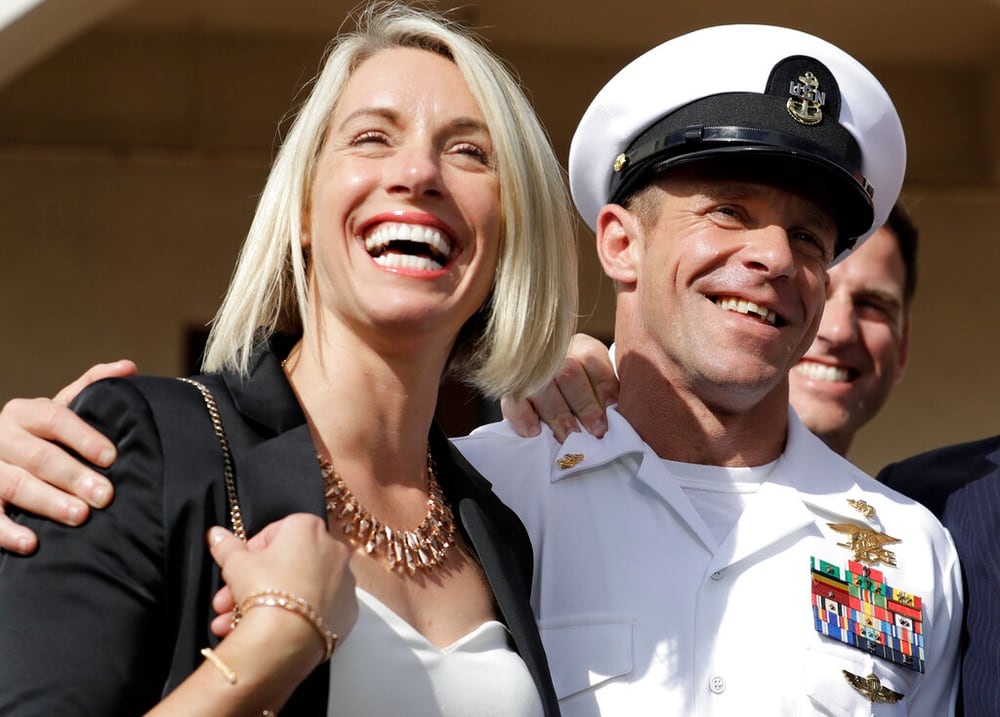Navy Secretary Richard V. Spencer entered the fray Friday against President Donald J. Trump, siding with an embattled rear admiral over the sea service’s right to take away a SEAL’s trident, according to the news agency Reuters.
As a result, it appears that the Navy will proceed with the effort to formally remove Special Warfare Operator Chief Edward “Eddie” Gallagher from the SEAL community despite the commander in chief’s tweeted wish for the admirals to stand down.
What magnified the moment was the top Navy civilian’s disclosure of his decision during the Halifax International Security Forum — inside a foreign city amid an international gathering of national security experts.
“I believe the process matters for good order and discipline,” Spencer told Reuters, siding openly with Naval Special Warfare commander Rear. Adm. Collin Green in his attempt to haul Gallagher and three SEAL officers before a Trident Review Board to determine if they are qualified to remain in the elite teams.
Critics contend holding a job qualification board for a SEAL trying to retire from the Navy is merely a punitive exercise, the sort of administrative sanction designed to exact vengeance on young officers or enlisted sailors without the power to fight back.
Supporters, however, say the SEALs have a right to regulate their ranks and evict those who can’t measure up mentally or morally for the job.
Asked again by Reuters if he thinks that process should continue, the agency quoted Spencer as saying, “Yes, I do.”
Trump, the commander in chief of America’s armed forces, took to Twitter on Thursday to telegraph his displeasure with reports that Navy leaders were trying to take the SEAL’s trident.
“The Navy will NOT be taking away Warfighter and Navy Seal Eddie Gallagher’s Trident Pin,” Trump tweeted.
“This case was handled very badly from the beginning. Get back to business!”
RELATED

Late Friday, Navy Times contacted the Pentagon about Spencer’s statements but Chief of Naval Information Rear Adm. Charles Brown couldn’t confirm the accuracy of the Navy Secretary’s comments much less clarify his intended message.
He referred all questions to Spencer’s spokeswoman, Cmdr. Sarah Higgins, who didn’t return messages until Saturday morning.
In an email to Navy Times, she said Spencer’s “comments are in line with current White House guidance.”
It’s unclear if that’s true.
Although Gallagher was accused of a string of war crimes, including the murder of a wounded Islamic State prisoner of war, a court-martial panel of his peers in July acquitted him of every charge except the one that the he never denied — posing next to the corpse of a dead detainee alongside a dozen other service members who were never charged with any crimes.
Had the charge not appeared at a general court-martial trial, it likely would’ve been handled administratively, perhaps with little more than a verbal reprimand before Gallagher retired after two decades of service.
Instead, it was the legal flotsam left after the military jury washed away what was left of the Navy’s failed case against him.
Before Gallagher’s court-martial trial even kicked off, Navy judge Capt. Aaron Rugh sanctioned the prosecution for repeatedly violating Gallagher’s constitutional rights.
Part of Rugh’s punishment included booting Cmdr. Christopher Czaplak, the lead prosecutor, for his role in a warrantless surveillance program cooked up with Naval Criminal Investigative Service agents to track emails sent by defense attorneys and also to Navy Times.
They were accused of manipulating witness statements to NCIS agents; using immunity grants and a bogus “target letter” in a crude attempt to keep potential pro-Gallagher witnesses from testifying; illegally leaking documents to the media to taint the military jury pool; and then trying to cover it all up when they got caught.
In the end, the jurors recommended that Gallagher be demoted to petty officer first class, a verdict upheld by Chief of Naval Operations Adm. Mike Gilday but overturned by Trump last Friday.
Gallagher’s attorney rejected the Navy secretary’s claim that the Navy should proceed with the Trident Review Board despite Trump’s clear intent.
“The secretary should not be citing ‘good order and discipline’ as a reason to disregard a clear directive from the commander in chief,” Gallagher’s defense attorney, Timothy Parlatore, told Navy Times late Friday.
“Moreover, the secretary should not be supporting such action when he has failed to ensure good order and discipline is applied across the board by holding (Judge Advocate General’s Corps) prosecutors and NCIS agents accountable for their criminal conduct in the case.”
RELATED

Gallagher, 40, had been told by Navy officials he could retire by the end of November.
Instead, on Wednesday he was served with an order by Green to go before the Trident Review Board, a process that likely will extend his taxpayer-funded time in the Navy.
Echoing a similar statement from Chief of Naval Operations Adm. Mike Gilday’s spokesman, a day before Gallagher received his summons spokeswoman Higgins said Spencer “supports his commanders in executing their roles, to include Rear Adm. Green.”
That seemed to align the Navy’s top civilian and uniformed leaders against the president, an extraordinary rift in traditional civil-military relations.
In the wake of Trump’s Thursday tweet, Gallagher expected Green would relent, but was told that the board will continue, despite the president’s apparent wishes.
Late Thursday, however, CHINFO Brown seemed to offer a way out of the ring for Trump and his admirals, assuring Navy Times in an email that the sea service would follow “the lawful orders of the President.
"We will do so in case of an order to stop the administrative review of SOC Gallagher’s professional qualification. We are aware of the President’s tweet and we are awaiting further guidance.”
It remains unclear if Spencer’s riposte was the guidance the Navy expected but it’s one that Trump received Friday from Nova Scotia.
It’s also unclear if the Saturday email reflects Trump has conceded to Spencer and his admirals.
Now it’s the White House’s turn to decide what to do next — fire Spencer and Green, possibly even Gilday?
Order the Navy to stop the Trident Review Boards and see if the admirals and Spencer will resign?
Transfer Gallagher out of the SEALs into another unit, where he won’t fall under Green’s command, averting the board before he retires?
Do nothing and sacrifice Gallagher and the other SEALs to the bureaucratic grindstone of Green’s command?
No one is saying.
Navy Times editor’s note: This story has been updated to reflect a statement issued Saturday by the Navy secretary’s spokesperson. It also was updated to reflect questions about whether a tweet is an official order.
Prine came to Navy Times after stints at the San Diego Union-Tribune and Pittsburgh Tribune-Review. He served in the Marine Corps and the Pennsylvania Army National Guard. His awards include the Joseph Galloway Award for Distinguished Reporting on the military, a first prize from Investigative Reporters & Editors and the Combat Infantryman Badge.
